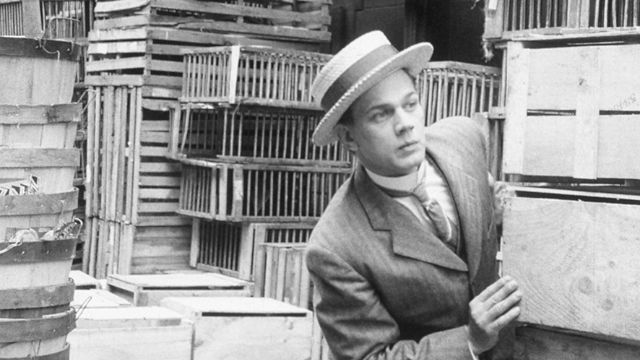TOO MUCH JOHNSON (1938, Orson Welles)


Antes de CITIZEN KANE.
Na sua ténue lógica narrativa e experimental construção formal, não custa compreender que TOO MUCH JOHNSON tanto se inspira no slapstick de Buster Keaton como nas obras surrealistas de Man Ray ou na dinâmica da teoria da montagem soviética. No entanto, esta incursão inicial de Orson Welles pelo Cinema — nunca idealizada como filme, pois foi produzido com o intuito de ser a vertente cinematográfica de uma encenação teatral — cimenta-se como importante curiosidade histórica, agora devidamente preservada, onde é possível observar o virtuosismo, a preocupação arquitectónica dos enquadramentos e a experimentação com a câmara do realizador que concebeu O MUNDO A SEUS PÉS (1941) e AS BADALADAS DA MEIA-NOITE (1965).
Na sua ténue lógica narrativa e experimental construção formal, não custa compreender que TOO MUCH JOHNSON tanto se inspira no slapstick de Buster Keaton como nas obras surrealistas de Man Ray ou na dinâmica da teoria da montagem soviética. No entanto, esta incursão inicial de Orson Welles pelo Cinema — nunca idealizada como filme, pois foi produzido com o intuito de ser a vertente cinematográfica de uma encenação teatral — cimenta-se como importante curiosidade histórica, agora devidamente preservada, onde é possível observar o virtuosismo, a preocupação arquitectónica dos enquadramentos e a experimentação com a câmara do realizador que concebeu O MUNDO A SEUS PÉS (1941) e AS BADALADAS DA MEIA-NOITE (1965).
Before CITIZEN KANE.
With a thin narrative logic and tentative formal framing, it isn't hard to understand that TOO MUCH JOHNSON gets its inspiration from Buster Keaton's slapstick, but it also owes to Man Ray's surrealist pieces or to the Soviet montage theory dynamics. However, this initial film foray by Orson Welles — it was not intended to stand as a full feature, since it was designed to be the cinematic aspect of a stage presentation — holds itself as a substantial historical curiosity, now duly preserved, where it is plain to watch all the virtuosity, the concerns about architectural framing and camera experimentation from the filmmaker who brought us CITIZEN KANE (1941) and CHIMES AT MIDNIGHT (1965).
With a thin narrative logic and tentative formal framing, it isn't hard to understand that TOO MUCH JOHNSON gets its inspiration from Buster Keaton's slapstick, but it also owes to Man Ray's surrealist pieces or to the Soviet montage theory dynamics. However, this initial film foray by Orson Welles — it was not intended to stand as a full feature, since it was designed to be the cinematic aspect of a stage presentation — holds itself as a substantial historical curiosity, now duly preserved, where it is plain to watch all the virtuosity, the concerns about architectural framing and camera experimentation from the filmmaker who brought us CITIZEN KANE (1941) and CHIMES AT MIDNIGHT (1965).

- . Ficha Técnica / Credits:
| Realização / Directed by | Orson Welles | ||
| Produção / Produced by | John Houseman, Orson Welles | ||
| Argumento / Written by | William Gillette, Orson Welles | ||
| Fotografia / Cinematography by | Paul Dunbar, Harry Dunham | ||
| Elenco / Cast | Joseph Cotten (Augustus Billings), Virginia Nicolson (Lenore Faddish), Edgar Barrier (Leon Dathis), Arlene Francis (Mrs. Dathis), Ruth Ford (Mrs. Billings) | ||
| Ano / Year of release | 1938 | ||
| País / Country | EUA / USA |
Comentários
Enviar um comentário